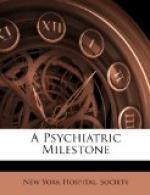Psychiatry gives us also a new appreciation of the religious life and needs of our race. Man’s religion shows in his capacity to feel and grasp his relations and responsibility toward the largest unit or force he can conceive, and his capacity for faith and hope in a deeper and more lasting interdependence of individual and race with the Ruler or rules of the Universe. Whatever form it may take expresses his capacity to feel himself in humility and faith, and yet with determination, a more or less responsible part of the greatest unit he can grasp. The form this takes is bound to vary individually. As physicians we learn to respect the religious views of our fellow beings, whatever they may be; because we are sure that we have the essentials in common; and with this emphasis on what we have in common, we can help in attaining the individually highest attainable truth without having to be destructive. We all recognize relations that go beyond individual existence, lasting and “more than biological” relations, and it is the realization of these conceptions intellectually and emotionally true to our individual and group nature that constitutes our various religions and faiths. Emphasizing what we have in common, we become tolerant of the idea that probably the points on which we differ are, after all, another’s best way of expressing truths which our own nature may picture differently but would not want to miss in, or deny to, the other. One of the evidences of the great progress of psychiatry is that we have learned to be more eager to see what is sane and strong and constructively valuable even in the strange notions of our patients, and less eager to call them queer and foolish. A delusion may contain another person’s attempt at stating truth. The goal of psychiatry and of sound common sense is truth free of distortion. Many a strange religious custom and fancy has been brought nearer our understanding and appreciation since we have learned to respect the essential truth and individual and group value of fancy and feeling even in the myths and in the religious conceptions of all races.
Among the most interesting formulations and potential contributions of psychiatry are those reaching out toward jurisprudence. Psychiatry deals pre-eminently with the variety and differences of human personalities. To correct or supplement a human system apparently enslaved by concern about precedent and baffling rules of evidence inherited from the days of cruel and arbitrary kings, the demand for justice has called for certain remedies. Psychiatry still plays a disgraceful role in the so-called expert testimony, largely a prostitution of medical authority in the service of legal methods. Yet, out of it all there has arisen the great usefulness of the psychiatrist in the juvenile and other courts. There it is shown that if psychiatry is to help, it should be taken for granted that the person indicted on a charge should thereby become




